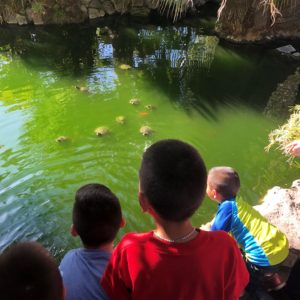
This August, CWS Durham case manager Krista Camp was deployed to the U.S.-Mexico border for ten weeks to support a shelter for asylum-seekers leaving detention. You can read her previous updates here and here.
Watching twenty-five women, men, and children from Guatemala and Mexico walk through an Arizona university campus wearing ankle monitors is something the students don’t see every day. However, when the weather cooperates and it’s not a monsoon or a million and two degrees, we take the families to walk through the university campus to visit the pond that is home to turtles and fish alike.
Over the past couple of months, our guests have been on the hardest journey of their lives that doesn’t end once they cross the border. After they arrive in the U.S. they are placed in cells as they wait to be processed by immigration and released to shelters, if they are lucky. Those men, women, and children who are not released to shelters are sent to detention centers where they continue their journey in prison as they await their immigration court dates. For those that do arrive, our goal is to make them feel as comfortable as possible, which includes allowing them to bask in their newfound freedom and explore the surrounding area.
The turtle pond is always a hit.
When we ask if anyone wants to take a walk to a nearby turtle pond, everyone is a bit skeptical. It doesn’t matter that we have been communicating with them in Spanish all day long, they don’t quite believe we understand what the word “tortuga” means. All of that doubt vanishes when we arrive. The pond is home to approximately 20 turtles and infinitely more fish. The children flock to the edge of the pond and lay on their stomachs to get as close as possible to the turtles. On this specific occasion, an unsuspecting college student started to feed the turtles and was immediately swarmed by 12 little children excitedly speaking Spanish and asking to help feed them. With broken Spanish she showed them how and made sure their fingers stayed safely out of reach of the turtles’ snapping mouths. It was heartwarming to watch and again I was blown away by the innate kindness we as human beings show one another even when we don’t speak the same language. This one small act of exploring a turtle pond is often the first time, since arriving to the U.S., that parents see their children exhibit pure joy; being part of that makes the hard days all the more worth it.
We stay at the pond for 30 minutes before making our way back to the shelter. Life stood still in those 30 minutes; parents had a nice reprieve from thinking about the journey ahead and everything they had been through to get there. In these moments, they reveled in the happiness of their children and the choice they made to come to the United States.
Stay tuned for more updates from Krista in the coming weeks. If you would like to support the work of CWS Durham, explore our website to learn how you can get involved or donate today at https://cwsrdu.org/give/.

